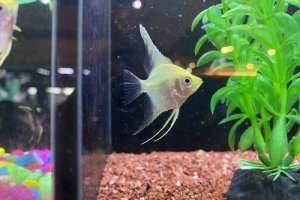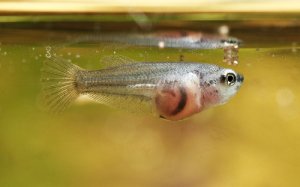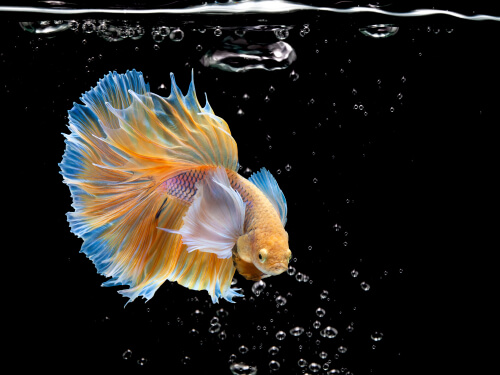
What if an emergency came up, and you had no way of getting to your betta fish for a few days? Do you think it would survive? You might wonder, “How long can a betta fish go without food?” It’s a valid question and likely one you will need to be answered at that moment.
When owning betta fish, you must keep an open mind because no two bettas are the same. Although some bettas have lasted long periods, this is not always the case. Typically, a betta can go between 10 to 14 days unfed. But some may not last that long.
When you leave a betta alone longer than planned, this question will be the first thing to pop into your head. After all, one of the causes of betta fish death is starvation. Before a betta reaches this point, it takes several days of survival.
Although it can endure a long period without food, starving is awful and can lead to your betta fish not moving. Furthermore, its condition worsens the longer it is left without food, eventually leading to health complications and death.
Factors That Affect The Survival Of An Unfed Betta
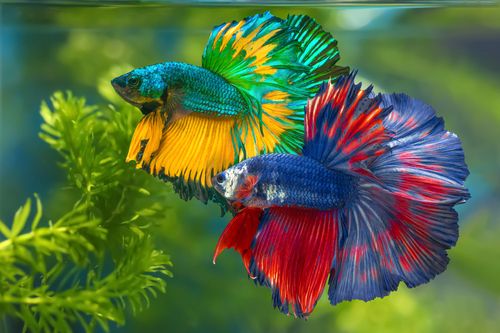
Bettas are undoubtedly able to endure the harshness of being left without any food. However, there are still factors that can profoundly influence the survival period. Of course, every fish comes with its perks and disadvantages. Therefore, controlling the elements in your betta’s surroundings is necessary for its survival.
1. Filtered vs. Unfiltered Tank
The amount of time your betta can survive without food is greatly influenced by its tank. When a betta fish tank is unfiltered, the lack of maintenance can introduce harmful and undesired elements.
For example, the build-up of debris in a tank causes the presence of bacteria or harmful diseases. These harmful factors in an unfiltered tank actively threaten your betta’s survival. It also worsens the long-term effects of being left without food. Again, this is due to the likelihood of bacteria. With no nutrients present to sustain the betta, irreversible damage can be done.
When you leave your tank for more than a week, an unfiltered tank is the worst thing you can have. Bettas in this tank are unlikely to remain the same after being left alone. In addition, an unfiltered tank will limit the amount of oxygen your betta fish has during this period of not being attended to. Lack of oxygen is undoubtedly going to be one of the causes of betta fish death.
2. Size Of Tank
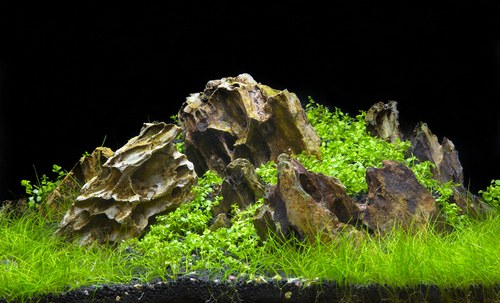
This is one of the most prominent factors affecting an unfed betta’s survival. Figuring out how long can a betta go without food is down to the tank size most of the time. Among the many types of fish that exist, bettas need a lot more when it comes to tank conditions. This allows them to thrive and be more vibrant.
The main appeal behind owning a betta is its appearance. Giving it the right tank will enable it to sustain the beauty that initially drew you in.
Smaller tanks are a bad idea if you’re wary of tank decay. If you want a betta that can at least survive without being fed for a few days, you will need a big tank that can take more than 5 gallons of water for each betta you own. One of the causes of betta fish death is stress, so curbing stress levels is best done with a bigger tank and good water conditions.
3. Health
The health of your betta is something that should never be overlooked. If you ever notice a betta fish not moving, its health conditions could be in a dire state. Furthermore, leaving it unattended for significant periods can adversely affect your betta’s health long-term.
Not all bettas have the same threshold for tank conditions. Therefore, the amount of time it can survive will largely be influenced by its health.
Bettas are usually more resilient when younger, have a fast metabolism, low-stress levels, and comfortable tank conditions. If your betta checks all the boxes, there’s a good chance it will survive being left unfed. In this case, how long can a betta fish go without food solely depends on how well its health is.
Bettas are easily susceptible to illnesses, so their health can change from one moment to the next if their surroundings are not ideal.
Different types of illnesses can pop up while caring for a betta. So be sure to watch out for them, especially if you plan on leaving for a vacation. The last thing you need is the sight of your betta about to die when you return.
How To Prepare Your Betta Fish Tank Before Leaving It For A Few Days
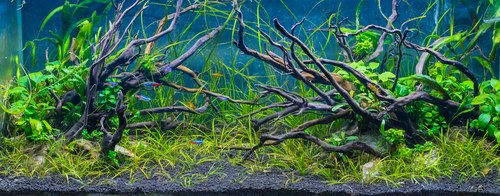
One of the most effective ways to ensure that your betta can go without food is by avoiding the causes of betta fish death. In other words, reducing stress factors and adjusting water parameters.
When your pet stays in an aquarium with ideal conditions, it is more likely to survive for up to two weeks in your absence.
Here are some things you can do to keep your tank safe and healthy before leaving:
- You will need to change your filters and replace them with more effective ones. You don’t want your betta living with a clogged filter.
- Check the water quality of your tank by using aquarium test kits (this should have a pH level that sits between 6.8 and 7.5).
- Remove dead plant matter and trim the length of your plants.
- Ensure that all your tank equipment is in pristine condition. Check on your heater, lights, air pump, and automatic feeder.
On the day you’re leaving, remember to do the following:
- Keep your water temperature between 76 to 82 degrees Fahrenheit.
- Perform a substantial water change. For example, if your tank is 3 gallons, change 80% of the water. However, if your tank is 5 or 10 gallons or more, you need to do a 50% water change.
- Check on the health of your betta and ensure that it is healthy enough to live without you.
- Feed it before leaving, using your regular feeding portions.
How To Feed Your Betta While Away
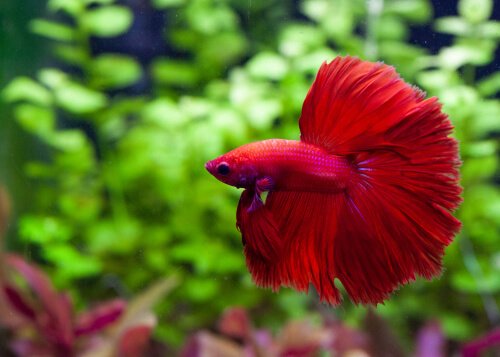
If you’re leaving your betta alone for a few days, you’ll need to give it something to feast on while away. Here are some options to consider:
1. Automatic Fish Feeder
This mechanism allows you to feed your betta without worrying too much. Of course, it isn’t risk-free, but it beats leaving your betta unfed for several days.
Many types of mechanical auto-feeders exist today, with most not costing too much. Generally, the more expensive ones tend to be more reliable. You should be able to find one at your local pet store.
Read up on their features to see which one works best for your needs. Automatic fish feeders work by storing the food in a small container, then dispensing it by rotating and releasing it according to the timer preset you’ve created.
It would be best to try it out for a few days before you leave. This way, you have a better chance of avoiding starvation, one of the top causes of betta fish death, if it doesn’t work. The most significant issue with fish feeders is the build-up of condensation from the tank.
In this situation, your feeder gets clogged by wet food, preventing it from being released. This is especially dangerous when you’ve already set your intentions towards leaving your betta at the mercy of a feeder while you’re away.
2. Block Feeder
Block feeders are large blocks of food that can be kept in your tank before leaving for an extended period. They gradually break down in the tank while you’re away. This method of releasing food guarantees that your betta will always have something to eat.
A block feeder can, however, be a risky choice. Sure, it’s a way for your betta to eat, but there are other concerns. For example, instead of considering how long can a betta fish go without food, you’ll need to consider whether or not the ammonia risk is worth taking. In addition, many people have reported that block feeders quickly reduce water quality in a tank.
If there’s no other option, then a block feeder can be your primary feeding method while on vacation. Be sure to perform a water test before adding it. Also, take some time to verify the effectiveness of your chosen brand of block feeder.
3. Enlist The Help Of Your Neighbor Or Friend
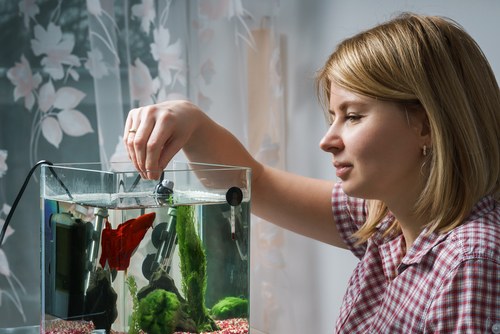
If there’s an option to do this, take it. Caring for a betta is best done with a human touch. There doesn’t have to be an extensive manual, especially if you’ll be gone for a few days. Instead, give the person helping you some written instructions and have them call you if any questions arise. This is a great way to avoid returning to a betta fish not moving.
With a fish sitter, you’re not only getting an efficient way to feed your betta, but you’re also getting a pair of eyes that can watch the behavior of your fish. In addition, they can check important parameters of your tank, such as the water temperature, heater, light fixtures, and the effectiveness of your filter.
Ideally, it would be best if you had a fish sitter friend help you. Someone with experience taking care of fish would be a bonus. On the other hand, enlisting the help of someone close to home is great. But you will have to deal with the task of deciding whether you can trust this person. Your best bet, in this case, is to choose someone that is at least enthusiastic about caring for fish.
Bottom Line
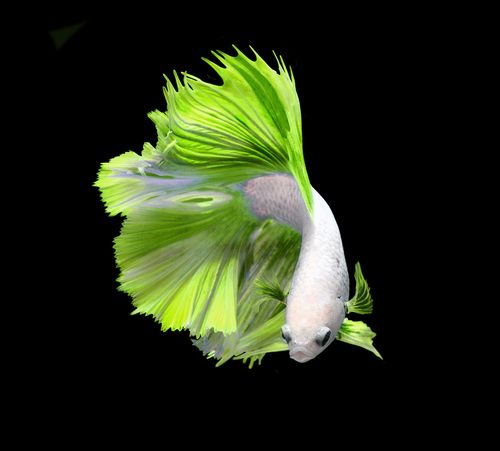
As a betta fish owner, leaving it without food is something you should never aspire to do. However, when faced with unavoidable scenarios, the content of this article will be helpful, especially in knowing what to do and how to implement those solutions properly.
Keep this guide accessible if you ever need to inform a fish sitter about betta care.



